Oxalate nutrition is a confusing, frustrating and little known area of health. There is a lot of conflicting advice about oxalate. Some of this advice is inaccurate and some is blatantly harmful. Read on for research-based advice on supplements to reduce oxalates.
*Please note that this post contains clearly identified affiliate links. If you click on these links and choose to make a purchase, I may receive a commission (at no cost to you). As an Amazon Associate I earn from qualifying purchases.
Table of Contents
Who Needs to Reduce Oxalates?
Before we dive into the oxalate supplement conversation, it is very important to understand who might need to reduce oxalate in the first place.
Oxalate may be a concern for people with calcium oxalate kidney stones. However, high urine calcium is the most common cause of kidney stones. But, if you have high urine oxalate on a 24-hour urine test, then oxalate should be addressed.
Oxalate is also a concern for people who have a very rare genetic disorder called primary hyperoxaluria. People with primary hyperoxaluria do not have an enzyme needed to break down oxalate, resulting in very high oxalate levels.
It should be noted that oxalate has not been well-studied in any other health condition including interstitial cystitis, arthritis, vulvodynia or autism. Some claim oxalate is the cause for numerous health conditions. This is simply not true and there is no data to back up the claim that a low oxalate diet will help these conditions.
Supplements to Reduce Oxalates
Calcium Supplements
Calcium supplements can reduce oxalates by reducing the absorption of oxalate in the intestine. However, calcium supplements are not ideal for most people with kidney stones.
Why? Calcium supplements are associated with a higher risk of kidney stones. Whereas calcium from food is associated with a lower risk of kidney stones. Calcium supplements seem to increase urine calcium more than calcium found naturally in food. (1) High urine calcium is the most common cause of kidney stones. Not high urine oxalate.
In some cases, especially for people who make oxalate stones as a result of bariatric surgery, inflammatory bowel disease or other intestinal problem, calcium supplements can be used safely to reduce oxalate. This is because urine calcium is usually normal and high oxalate is the primary cause of kidney stones. (2) Ask your dietitian what is best for you!
Vitamin B6 Supplements
Vitamin B6 (aka pyridoxine) converts glyoxalate to glycine in the liver. With vitamin B6 deficiency, glyoxalate can build up, which ultimately ends up as oxalate. It is easy to take this information and assume vitamin B6 supplements could help high oxalate.
In reality, these things are never that clear cut. Vitamin B6 deficiency is rare. It is found in a large variety of foods such as meat, fish, potatoes, fruits and other veggies. (3) It is easy to eat enough vitamin B6 from food. Eating more vitamin B6 than you need will not reduce oxalate. Your body will just get rid of extra vitamin B6. There is no association between vitamin B6 levels, vitamin B6 intake and kidney stones or urine oxalate. (4)
For most people with kidney stones or high oxalate, vitamin B6 supplements will probably not make a difference.
However, people with primary hyperoxaluria are different! They do not have the enzyme that converts glyoxalate to glycine. Because the cause of high urine oxalate is unique, treatment is different. Vitamin B6 supplementation may help lower oxalates for people with primary hyperoxaluria. (5) Ask your dietitian what is best for you!
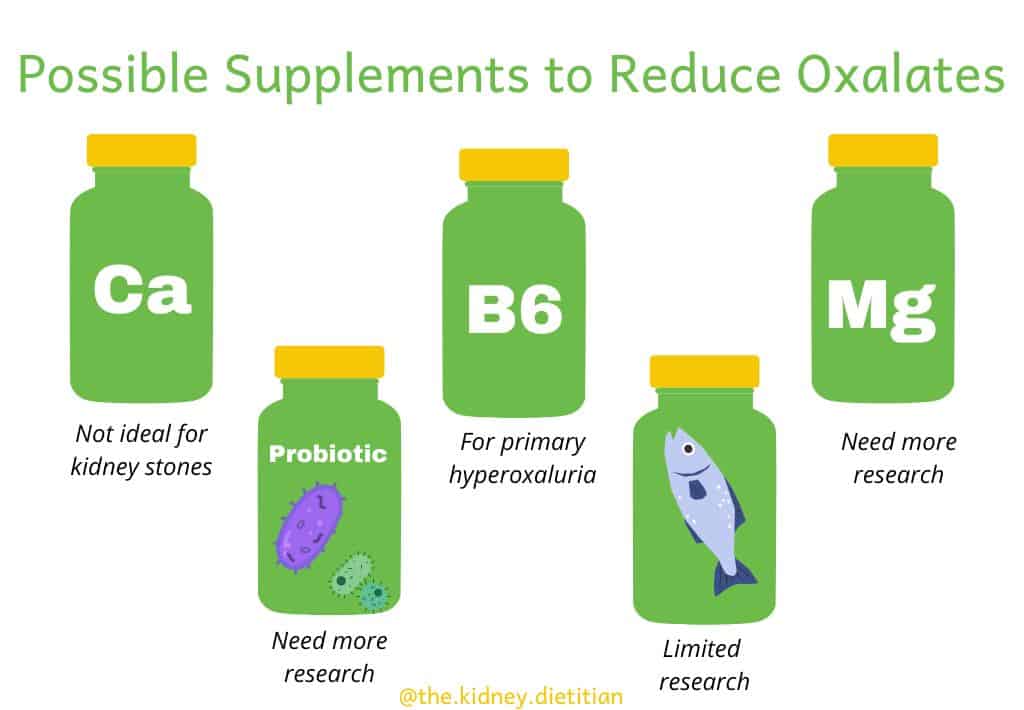
Magnesium Supplements
Magnesium definitely plays a role in kidney stones. People with kidney stones tend to have lower magnesium levels. (6) We know that magnesium and oxalate like to bind. When oxalate binds with magnesium, it is unable to bind with calcium and make a kidney stone.
However, magnesium supplements do not seem to consistently prevent kidney stones. (7) (8) A few small studies have found lower urine oxalate with magnesium supplements. (9) (10) We need more research to know who magnesium supplements could help prevent kidney stones and lower oxalates.
More about magnesium and kidney stones.
Fish Oil Supplements
There is some promising research on fish oil supplements and oxalates. One small study found that fish oil supplements can reduce oxalates in people who were eating a moderate amount of oxalate. (11) However, another study found that fish oil did not reduce oxalates for people on a low oxalate diet. (12)
In 2020, an analysis of all research available concluded that fish oil can help treat calcium oxalate kidney stones for people with high urine oxalate. (13)
I recommend Nature Made* fish oil supplements if you choose to use them to lower oxalates. This supplement has a USP verification and enough EPA and DHA to reduce oxalates.
Probiotic Supplements
There is a lot of research going on right now to see if probiotic supplements can reduce urine oxalates and help prevent kidney stones. The gut microbiome, kidney stones and oxalate metabolism are clearly linked. (14)
Unfortunately, trials to see if probiotics can reduce oxalates or prevent kidney stones have been mixed. Some animal trials have found that probiotic supplements can reduce oxalates. But, results in humans are varied and temporary. (14) (15) Chances are, the best way to support a healthy gut microbiome to prevent kidney stones is to eat a diet rich in fiber, whole grains, fruits and vegetables. We need more research before I can make a recommendation for probiotic supplements to reduce oxalates.
Supplements That Can Make Oxalate Worse
Turmeric Supplements
Turmeric is very high in oxalate. Supplemental turmeric is a very concentrated form of turmeric, and is therefore likely incredibly high in oxalate. Turmeric supplements should be avoided for people with high urine oxalate.
Of note, I am rarely concerned about using turmeric (or any other spice!) in cooking. Realistically, the amount of oxalate you get from a tablespoon(ish) of turmeric in your entire pot of curry (or other dish!) is minimal.
Cinnamon Supplements
Cinnamon is also very high in oxalate. Similar to turmeric, cinnamon supplements are a very concentrated source, and are probably very high in oxalate. Cinnamon supplements should be avoided for people with high urine oxalate.
Just like turmeric, the amount of oxalate you get from eating cinnamon is minimal and is not concerning.
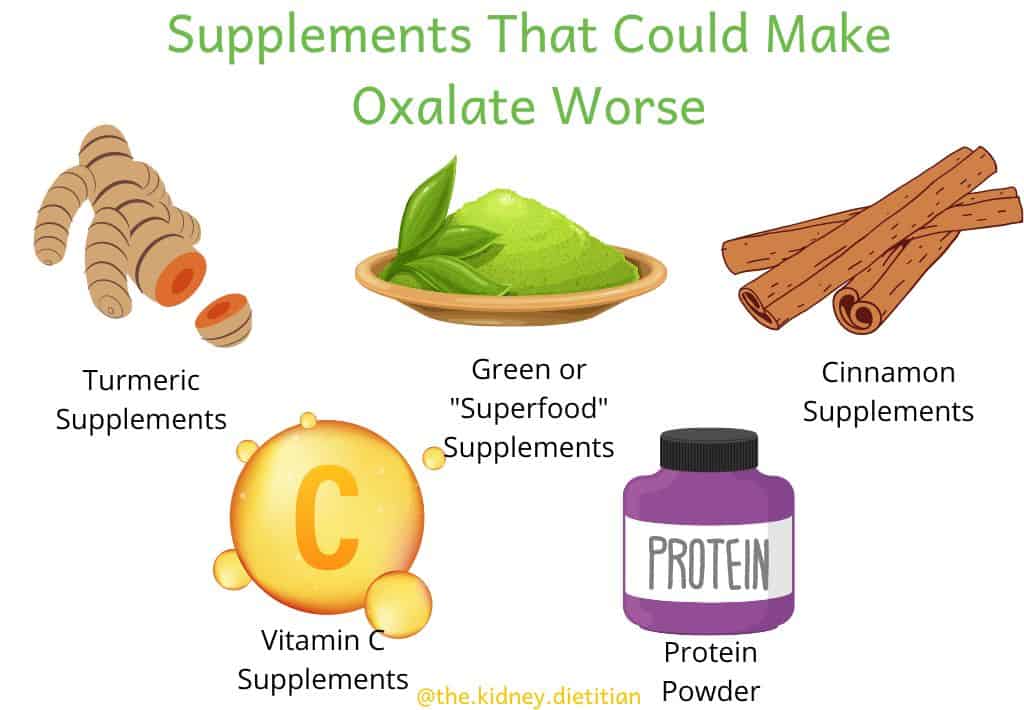
“Superfood” Powders and Pills
Any type of “superfood” supplement is also potentially very high in oxalate. Many of these are made from powered vegetables. The vegetables in these supplements tend to be very high oxalate choices. For example, spinach is a common ingredient in these products, which has about 7x more oxalate per serving than any other food.
It is much better to actually EAT your fruits and vegetables than get them from a pill or powder anyway!
Vitamin C Supplements
Your liver can make oxalate from a few different things, including excess protein, fructose and vitamin C (aka ascorbic acid). Vitamin C supplements have been shown to significantly impact the amount of oxalate in urine. They should be avoided for anyone with high urine oxalate. (15)
It seems like vitamin C is in everything these days! It might be hiding in your orange juice, cough drops and immune supporting vitamins. Make sure to check those labels!
Never fear, it is easy to get enough vitamin C from food. One orange or bell pepper has nearly your entire days recommendation for vitamin C. Eating a balanced diet with plenty of fruits and vegetables nearly guarantees enough vitamin C.
Of note, vitamin C in FOOD should not be limited for people with high oxalate. In fact, foods with vitamin C tends tend to be very GOOD for kidney stone prevention. Vitamin C is highest in many fruits and vegetables. People who eat more fruits and vegetables tend to have fewer kidney stones. (16) (17)
Protein Supplements
Your liver can also make oxalate from extra protein. However, the impact of protein on urine oxalate is relatively small. (15)
Most people are eating more protein than they need. Protein powder or supplements often just add even more unnecessary protein, which could have a small impact on oxalate. More concerning, that extra protein could reduce urine citrate, reduce urine pH and increase urine calcium. All of these things could increase risk of calcium oxalate kidney stones. (2)
Everyone has different protein needs! Ask your dietitian how much protein is right for you, and if you are eating too much.
How Can I Reduce Oxalates?
Now that you know the options for supplements to reduce oxalates are limited. What can you do?
Again, reducing oxalate is only a concern for people who have high urine oxalate on a 24-hour urine test.
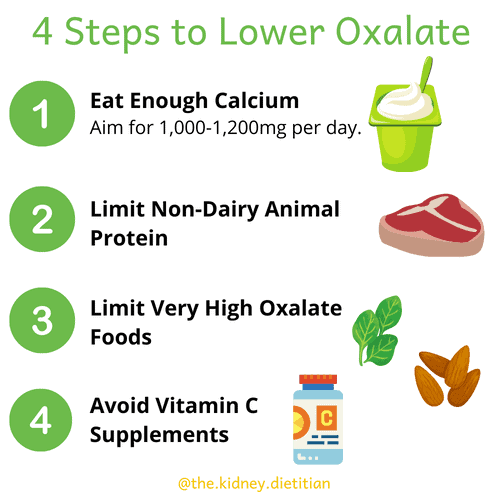
Eat Enough Calcium
The most effective way to lower urine oxalate is to make sure you eat enough calcium. Calcium can reduce how much oxalate is absorbed in the intestines. (2) Eating enough calcium can reduce the risk of calcium oxalate stones by 50%. (18)
Most people with kidney stones should eat 1,000-1,200mg calcium per day. (19) Learn more about the best sources of calcium for kidney stones.
Check out my cookbook full of high calcium recipes, just for people with calcium oxalate kidney stones!
Avoid Excess Protein
Your liver can make oxalate from extra protein. Although the impact of excess protein on oxalate is small, it does have an impact. More importantly, too much protein can increase urine calcium, reduce urine pH and reduce urine citrate. (2)
Excess protein, especially from foods like meat, chicken and fish, has been linked to a higher risk of kidney stones. (19)
Learn more about protein and kidney stones.
Avoid Very High Oxalate Foods
For most people, eating enough calcium is enough to lower urine oxalate to a safe range. However, some people have stubborn urine oxalate that will just not go down!
In this situation, it is recommended to cut back how much oxalate you eat. (18) The best way to do this is limit foods very high in oxalate. These foods include:
- Spinach & Swiss Chard
- Navy Beans
- Raspberries
- Rhubarb
- Potatoes
Grab my complete oxalate food list!
Join Kidney Stone Nutrition School!
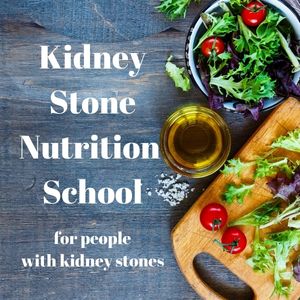
Perhaps this article just left you more confused about oxalates and what you can do to prevent kidney stones.
Ultimately, nutrition to reduce oxalates and prevent kidney stones is different for every single person. There is no single kidney stone diet. Nutrition must be personalized to your 24-hour urine test and type of kidney stone.
I’d love to help you stop those kidney stones and living in fear of everything you eat! I do this every day with a personalized, evidence-based approach in Kidney Stone Nutrition School! Hope to see you there.
Happy Eating!
Melanie

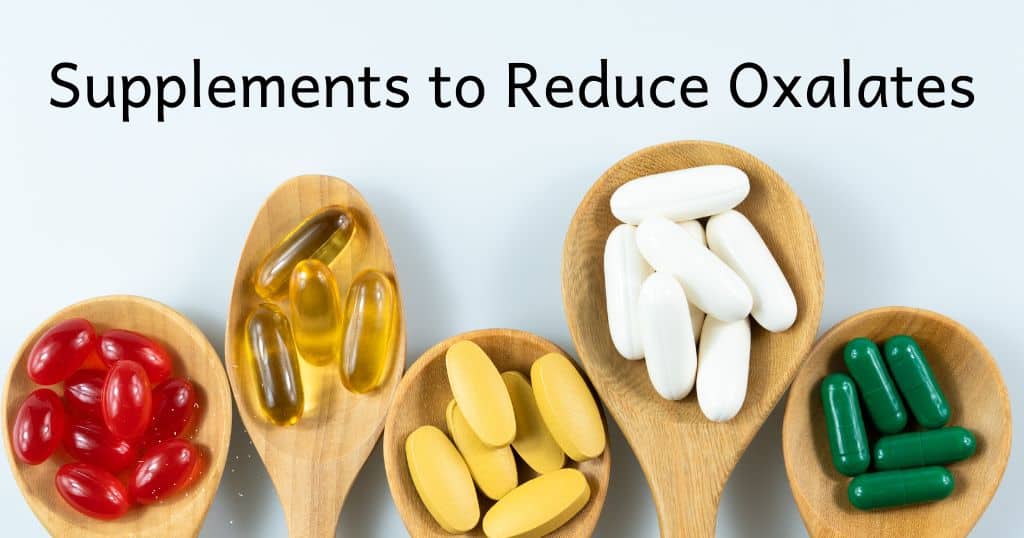
I am having that feeling in my mouth all day long…. like eating spinach?? I changed my toothpaste, not eating a lot of spinach, kale or foods high in oxalates. Any ideas on why my mouth is acting this way? There is no white film, just that feeling like I ate raw or even cooked spinach.
Without knowing more about your medical history I couldn’t ethically make a guess as to what is going on with you. There is no research or biological reason why eating spinach would cause any odd feeling in your mouth.
Hi! I have a question regarding calcium in different food. Unless I misunderstood, it seems like you’re saying that almond milk is OK to drink because of its high calcium. I noticed on another section that you say not to have almonds because it is so high in oxalate which I presume is also almond milk. I don’t eat or drink anything that is from almonds
I’m not necessarily saying almond milk is ok to have – it 100% depends on your 24-hour urine test!
Hi
My urine test came positive for crystals, no number associated with it. So I am assuming it’s not very high. I asked my doctor why I am having so many symptoms, he just told me to drink more water. So I have been drinking lots of it now.
How long would it take for me to oxalate dump, and have no more symptoms?
Also, for example if I want to have pistachios, I know are very high in oxalates, but if I keep all the rest of my foods very low, do I steel need to drink milk (to have calcium with it), or can I save the milk for another time during the day if I were to have another oxalate food? This is so confusing for me
Hi Lana! I’d check out this post about oxalate dumping. You likely don’t need to worry about oxalate at all. And pistachios are actually a low oxalate nut.
Some of the countless food lists are pretty much the same, BUT some are contradictory … question = some say steamed broccoli is bad, and boiling is good … what about raw ? and same for carrots … help !!! thanks so much … do you have a Facebook page ? or youtube videos ? thanks again Harry Shigeura …
Hi Harry! I have no idea why steamed broccoli would be “bad”. I actually don’t recommend boiling – it does reduce oxalate, but also every other water soluble vitamin in the food. The cost: benefit ratio here just doesn’t make sense. I do have a Facebook page, Instagram page and podcast on YouTube.
Hi, thank you for this article. It has occurred to me that some magnesium supplements include magnesium taurate or magnesium glycinate. I saw one that has 200mg magnesium in two pills, from 2500mg magnesium taurate in those two pills. Does that mean that each capsule has over one gram of taurine, an amino acid? I also saw on a nutrient-tracking website that an egg has about 6 grams of protein from different amino acids. I don’t know enough about biology and chemistry to know whether some amino acids are more likely than others to be made into oxalic acid in the body?
There are some specific amino acids that can be turned into oxalate. BUT, I would really advise people not to focus down to this individual amino acid level. Proteins are made of all types of amino acids, and trying to limit just a couple will drive you up a wall!
In terms of how much taurine is in each of those supplements, I’d have to look at the label to see if we are even able to figure that out!
Hi! I had previously taken a lot of L-lysine regularly for cold sore prevention for years. I recently saw an article, after being diagnosed with a 6mm stone (doing the 24 hour urine test!), that excess lysine could cause stones. I know that you can’t tell me anything specific due to not knowing what my stone is made of yet, but are you familiar with this about lysine, is it true? Thank you
Hello! Great question. Lysine is an amino acid – which is what protein is made of. Your liver can make oxalate from excess protein – and some specific amino acids, lysine included! This is one of the reasons why we want some people to avoid excess non-dairy animal protein!
Thank you. So it’s definitely a possibility that my overdose of Lysine contributed to my stone formation?
Also, I completed the 24 hour test and the only abnormal marker was super high urine calcium at like 347.
I do not ingest calcium as I avoid all dairy for years. So is my body leaching calcium from bones and it’s getting into urine causing stones? I’ve read most of your articles already, trying to figure this all out!!
I *might* be. However, knowing that only urine calcium was high makes me think that was less the case. Honestly, stones are RARELY the result of ONE thing. Usually is is sort of a perfect storm situation with lots of contributors. You actually DO want to make sure you eat enough calcium to help prevent most calcium stones. This article will help! I have a kidney stone diet guide and my course to help you really dive into those urine test results and know exactly what you can do to get that urine calcium down!
Hi right now I was told I have a 2mm kidney stone in me. Besides drinking plenty of water, which i don’t like the taste. Please can you give me any other advice, thank you.
Oh no. I’m so sorry to hear that! Nutrition is all about preventing stones from forming in the first place – and stopping stones you have from getting any bigger. To know what you can do, you really need to get a 24 hour urine test to better understand your urine chemistry and what is “off”. Here is a post to learn more!
chug the water so you get enough
Hi! Came across a website called Kidneycop. They reportedly have a “well researched” supplement that prevents calcium oxakate stones. Is this true or just marketing hype? It is so hard to know what to trust. Really appreciate your work!! Thank you!
There are a ton of stone supplements like this. Essentially they are all just large doses of alkali/citrate – which may be beneficial for some, but actually harmful for others. Dr. Coe, a previous colleague of mine at the University of Chicago has written a comprehensive review of products like this, including Kidneycop.
Thank you!!
Hi again. What can you tell me about nutritional yeast (aka “nootch”) and its impact on kidney stones formation? Nootch (and other forms of yeast in general) contains purines, which can get converted to uric acid, and too much uric acid can result in uric acid kidney stones. Or so I’ve heard. How much nootch per day is too much for uric acid kidney stone sufferers? (I’m only talking about non-fortified nootch here).
Nutritional yeast is relatively high in purines which do get converted to uric acid. However, a low urine pH is really the primary driver of uric acid stones (now high uric acid). Not that high uric acid levels don’t matter. The amount that is ok for you really depends on that rest of foods you eat and your urine risk factors, so I can’t even venture a guess for you!
Thanks. My urine uric acid level was 4 at my last test a year ago (which I understand is on the low end of normal) and my urine pH has varied between 7 and 7.5 over the past 5 years. So, it would seem that I’m in pretty good shape, at least as far as those indicators go!
Hi Melanie. Always enjoy reading your articles . Eating tums for GERD (1500 mg) / day , could it have an effect on the formation of stones . Calcium oxalates stones . Thanks
Hi Ross! YES….it absolutely could be. Especially if you have high urine calcium.